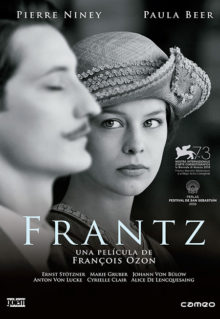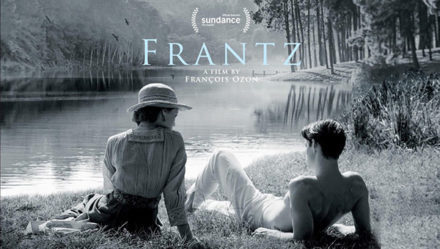 Frantz
Frantz
Directed by François Ozon
Written by François Ozon and Philippe Piazzo
Premiered September 2, 2016, at the Venice Film Festival
Drama (foreign, romance)
113 min.
Review by Stephen O. Murray
October 25, 2017.
François Ozon (born in 1967), like George Cukor and Pedro Almodóvar, is a gay director who usually makes movies about female characters. (Time to Leave and In the House were exceptions, though each had major female parts.)
Despite the title, Frantz (2016) focuses on a young woman, Anna [Paula Beer, who was 20 when the film was shot] a young German woman whose fiancé [Fran Hoffmeister] was killed in the last months of World War I. In 1919, she lives in Quedlinburg with the couple who would have become her in-laws and tends the grave (which has a tombstone but no body interred) every day.
Anna is puzzled that there are flowers not placed by her or the Hoffmeisters. The responsible party turns out to be Adrien [Pierre Niney], a slender and delicate (if not quite fey) German-speaking French veteran who attempts to speak to Franz’s father, Dr. Hans Hoffmeister [Ernst Stötzner], but is driven out before he can say anything about why he has come.
Franz’s mother [Marie Gruber] insists on receiving and hearing out the Frenchman, and eventually he becomes a sort of surrogate son. It turns out that he is a professional violinist. Franz was an amateur, and Adrien evokes tutoring Franz. The movie is in black and white, but the flashbacks are in color.
 Adrien is well on the way to replacing Franz as Anna’s beau. In the original play (by Maurice Rostand, son of Edmond, author of Cyrano de Bergerac) and a 1931 movie adaptation by Ernst Lubitsch (Broken Lullaby), Adrien marries Anna. In Ozon’s reimagining, Adrien flees, and the whole second half of the movie takes place in France where Anna searches for and eventually finds Adrien. There are several major surprises. One that is not dwelled upon is that when Franz lived in Paris before the war, he stayed in a hotel mostly occupied by prostitutes.
Adrien is well on the way to replacing Franz as Anna’s beau. In the original play (by Maurice Rostand, son of Edmond, author of Cyrano de Bergerac) and a 1931 movie adaptation by Ernst Lubitsch (Broken Lullaby), Adrien marries Anna. In Ozon’s reimagining, Adrien flees, and the whole second half of the movie takes place in France where Anna searches for and eventually finds Adrien. There are several major surprises. One that is not dwelled upon is that when Franz lived in Paris before the war, he stayed in a hotel mostly occupied by prostitutes.
I want to avoid plot-spoilers but have to mention a third strong and compassionate woman (in addition to Anna and Frau Hoffmeister), Fanny [the somewhat butch Alice de Lencquesaing] and another strong by less compassionate one, Adrien’s mother, played by Cyrielle Clair.
Departing from Rostand and Lubitsch, Ozon makes Anna the protagonist of the movie. Beer carries the movie, though the other players, including the two main male ones (Adrien and Dr. Hoffmeister), are exceptional.
The didactic center of all three versions is Dr. Hoffmeister challenging his hate-filled drinking buddies, incensed that he is receiving a Frenchman in his home. He recalls them celebrating the death of French sons with beer, even while French fathers celebrated the death of German ones with wine, and rhetorically asks: “Who sent that young man out to kill Germans? And who sent m boy? And who sent your boys?” He also supplies the answer: “We did.”
Ozon has been much influenced by Alfred Hitchcock, and “Frantz” is something of a variation on Vertigo, focused on the recreation of a character, though Adrien is the main architect of the one here, rather than being (re)formed by the desolated survivor. One scene with distorted colors particularly called Vertigo to my mind.

Though I have liked a number of Ozon movies, starting with 8 Women (2002), I still loathe his earlier, critically acclaimed ones, including his Fassbinder adaptation, Water Drops on Burning Rocks (2000). I think that Frantz is a masterpiece. Some might find it a bit slow, but I find it very subtle (I am not sure who is in the final scene in the Louvre, however).
The Blu-Ray has a very interesting Q&A from New York (in English) with Ozon in which he is candid about encouraging audiences to imagine what 1930s audiences would not (along with our knowledge of what happened in the years following this story!). He also notes that he had not anticipated how relevant a portrayal of fervent nationalism (or of lying) would be when he began making the movie. The Blu-Ray booklet includes a one-page statement from Ozon that repeats some of the same things, and an insightful essay by Scott Tobias.
(BTW, “Frantz” is a French hypercorrect mis-rendering of the German name Franz, as well as a variant of “François” and of “France.”)
©2017, Stephen O. Murray

